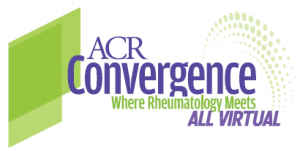 ACR CONVERGENCE 2020—The ACR’s first fully virtual annual meeting kicked off on Thursday, Nov. 5. During the Opening Session, ACR President Ellen M. Gravallese, MD, talked about how the specialty’s response during the pandemic has provided great hope and will help rheumatology become an even more essential specialty.
ACR CONVERGENCE 2020—The ACR’s first fully virtual annual meeting kicked off on Thursday, Nov. 5. During the Opening Session, ACR President Ellen M. Gravallese, MD, talked about how the specialty’s response during the pandemic has provided great hope and will help rheumatology become an even more essential specialty.
At the first Plenary Session on Friday, Nov. 6, speakers highlighted findings relevant to the COVID-19 pandemic: the potential pathogenicity of antiphospholipid antibodies and the risks of poor outcomes in infected people with rheumatic diseases. Another key topic: Racial differences in lupus patients with respect to potential disease markers and outcomes in stroke and ischemic heart disease.
Antiphospholipid Antibodies in COVID-19
Accumulating evidence has raised concerns about the risks of arterial and venous thrombosis in patients with COVID-19. Yu (Ray) Zuo, MD, a clinical assistant professor in the Division of Rheumatology, University of Michigan, Ann Arbor, discussed the role prothrombotic antiphospholipid antibodies may be playing in COVID-19 pathophysiology.
As a part of acquired antiphospholipid syndrome, such antibodies promote thrombus formation. “Catastrophic antiphospholipid syndrome is the most severe type and is frequently fatal,” Dr. Zuo noted. “Clinically, it bears some similarities with severe COVID-19, such as cytokine storms and diffuse coagulopathy.”
Previous small case reports and series suggested antiphospholipid antibodies might be present in COVID-19 patients and might be contributing to thrombosis. Viral infections generally are a well-known trigger for the transient appearance of these antibodies, but their overall pathogenicity remains poorly understood.
Dr. Zuo and colleagues obtained serum from 172 patients who had been hospitalized for COVID-19 and checked for eight different types of antiphospholipid antibodies. Fifty-two percent were positive for at least one.
“To our surprise, the most prevalent antiphospholipid antibody among COVID patients was not a well-studied one: [anti-phosphatidylserine/prothrombin] IgG,” Dr. Zuo related. This antibody is not currently part of standard antiphospholipid syndrome criteria, but it is thought to correlate with rates of thrombosis.
In other analyses, the team found higher levels of antiphospholipid antibodies in patients with more severe manifestations of COVID-19. Positivity for various antiphospholipid antibodies was associated with higher levels of neutrophil extracellular trap (NET) formation, as well as with a lower estimated glomerular filtration rate and more severe respiratory disease. High levels of NETs have also been demonstrated in hospitalized COVID-19 patients with severe respiratory impairment. Past work in antiphospholipid syndrome patients has demonstrated higher levels of circulating NETs, which may play a role in thrombosis.

